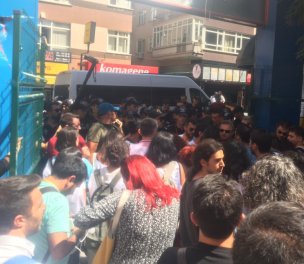One-day strike by teachers against new occupational law

Teachers organized a one-day strike today, November 2 against a new occupational law jointly called by 14 teachers' unions. The same unions had read out statements and wore cockades protesting the new law at schools last week.
The one-day action came before the first "Career Steps Exam" to be organized on November 19, where thousands of teachers are to participate.
The "Occupational Law for Teachers" no 7354 was adopted in the Parliament on February 3, 2022 by the parliamentary majority of the AKP-MHP block.
The slogans of the teachers going on a one-day strike today were "repeal of the Law no. 7354 and cancellation of the career steps exam," ''no to career hierarchy" and "equal pay for equal work."
Striking teachers demand that;
The career exam to be held on November 19 should be canceled at once;
School year preparation allowance equal to one salary and other allowances should be given to all education employees without discrimination;
Salaries of all education employees are raised over the poverty level;
Oral interview is not practiced for employment in public schools;
The injustice in income taxes resulting from tax bands should be put to an end.
Massive walkouts and demonstrations took place today in many cities including İstanbul, Uşak, Hakkari, Giresun, Mersin and Şırnak.
Criticized aspects of new occupational law
The new occupational law for teachers does not include any basic rights for teachers in the private sector.
The law divides the teachers in public schools in categories such as a candidate teacher/teacher/expert teacher/headteacher, and defines different career steps and different salaries for teachers doing the same job.
The law also brings advantages for teachers doing postgraduate studies, but the relevance of postgraduate education outside the education field is questioned while there are also concerns about some private universities preparing to provide postgraduate diplomas for a fee without any academic studies.
The new law introduces a "Career Steps Examination" and a "Central Examination Commission" that will serve directly under the Ministry. Teachers' unions argue that this will bring about more favoritism and also division and unrest among teachers.





